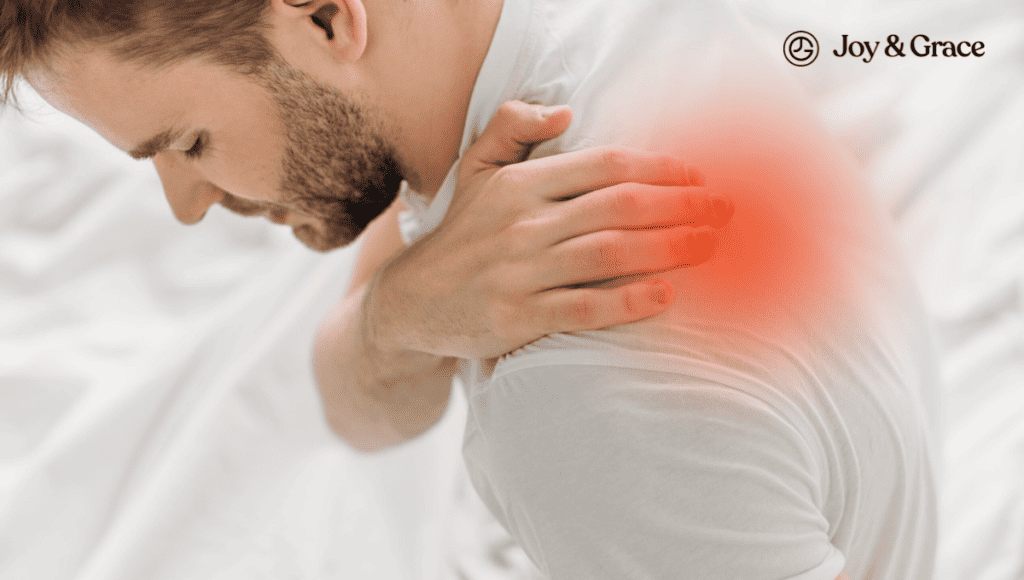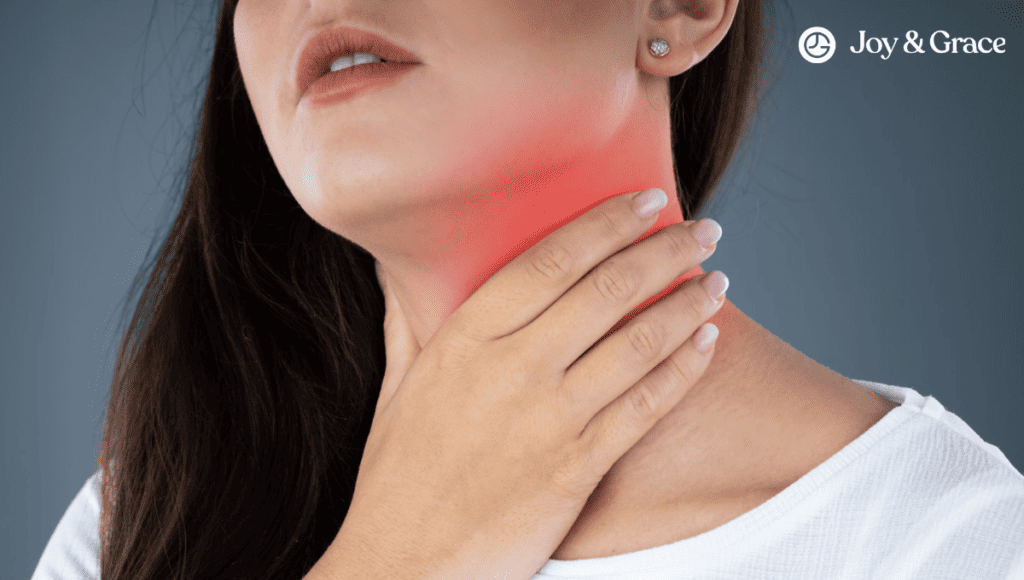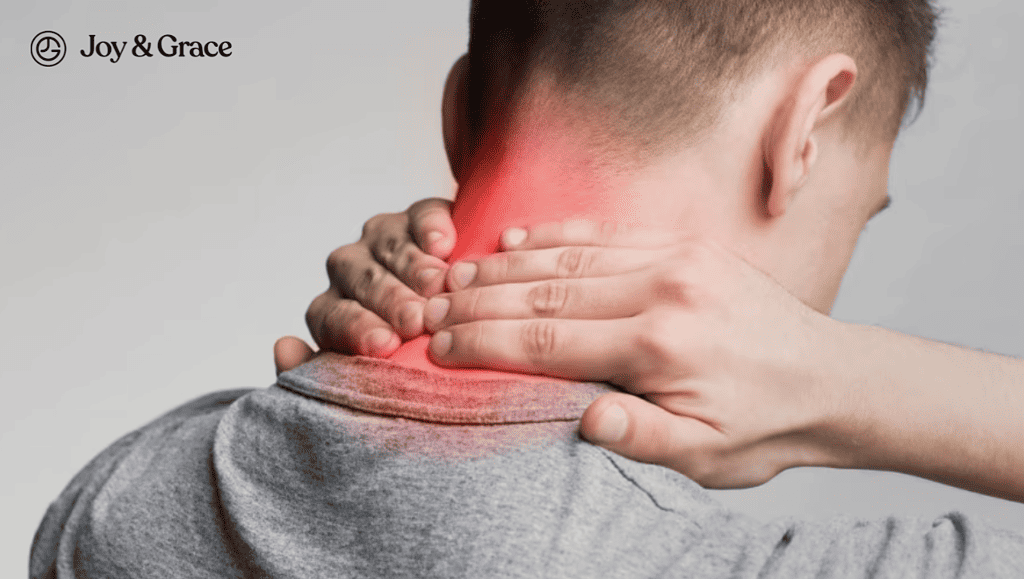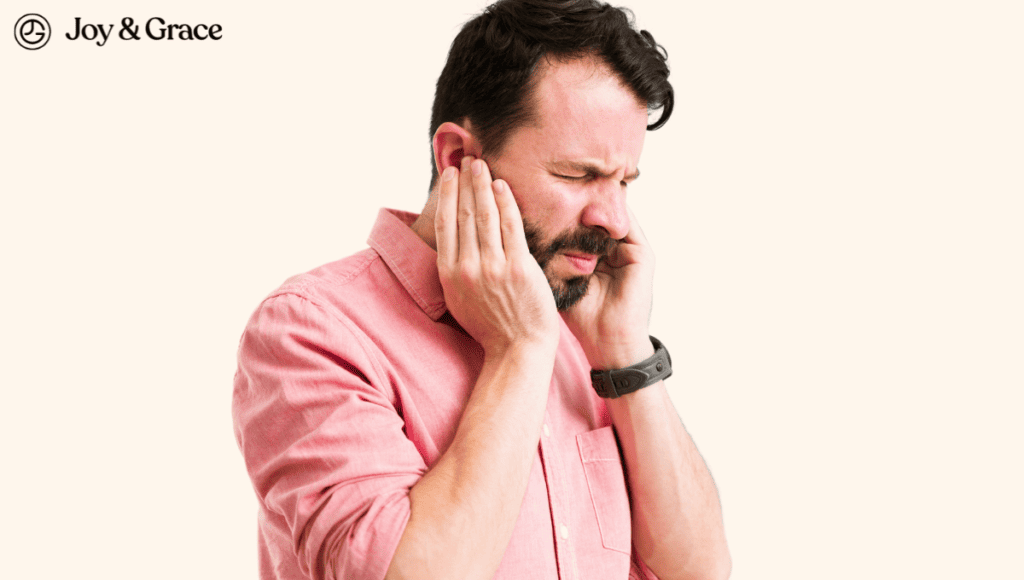Have you ever wondered why your left shoulder aches at the back? This nagging pain can be more than just a nuisance; it's a puzzle your body asks you to solve. From simple muscle strains to complex joint issues, the causes are as varied as they are intriguing.
What Causes Pain at the Back of the Left Shoulder?
Most of the time, pain at the back of the left shoulder isn't a sign of anything serious.
Our shoulders do a lot for us, from reaching and lifting to carrying heavy bags, so it's no wonder they might feel slightly sore now and then.
Let’s take a look at the usual suspects first.
1. Poor Posture
Even though you might not be aware of it, many things can affect your shoulders when you sit or stand.
There’s concrete evidence that bad posture can mess up the balance of your neck and shoulder muscles, resulting in pain in the back of your left shoulder.
Slouching, leaning forward too much, or spending time in odd positions can strain shoulder muscles. Maintaining good posture and exercising can help.
2. Muscle Strain
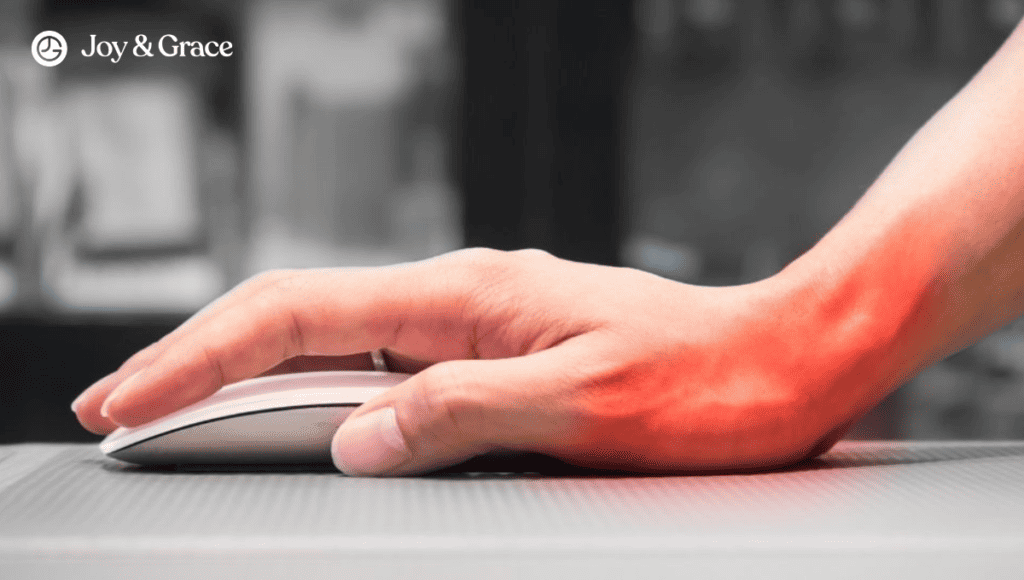
Another common reason for pain in the back of your shoulder is muscle strain.
This can often happen if you use your shoulder too much or incorrectly.
As an example, a study found that long-term use of a computer mouse can hurt the shoulder muscles, a condition referred to as Mouse Shoulder. The pain is moderate and usually lingers on the shoulder blade.
What Does It Mean When You Have a Sharp Pain in Your Upper Left Back?
Feeling a sharp pain in your upper left back can be scary, but most of the time, it’s nothing to worry about. Usually, this kind of pain is due to muscle strain. Perhaps you've done heavy lifting or suddenly moved, causing your muscles to stretch too much.
In addition to pain, muscles that have been strained may sometimes spasm, which means they contract more than they should. All these can result in a sharp or stabbing pain that may even take your breath away for a moment.
Nevertheless, if the issue continues, this kind of pain could also be a sign of a pinched nerve. This may occur if something, such as a herniated disc, is compressing a nerve.
Symptoms can vary, including anything from a dull ache to a sharp, stabbing pain.
Let’s elaborate.
3. Herniated Disc
The discs in your neck act as cushions and support for your neck bones (vertebra). If they get damaged or bulge out (herniate), they can press on nerves, leading to a pinched nerve.
This usually happens from aging, injuries, or repeated stress from things like lifting heavy objects.
What Are the Symptoms of a Pinched Nerve in the Shoulder Blade?
Here are the main signs of a pinched nerve in the shoulder blade:
- Pain:
This is the most common symptom. Usually, the pain is sharp or burning and can extend down the arm. Certain movements, like turning the neck, can make the pain worse.
- Numbness, reduced feeling, or changes in sensation:
People with a pinched nerve frequently experience numbness or a decreased sensation in the nerve's affected area, which may include the arm and fingers.
For instance, if you have a pinched nerve in your neck, you might not feel your fingertips as well as usual.
- Tingling sensation or 'pins and needles':
This weird feeling, also known as paresthesia, is another common symptom.
- Muscle weakness:
A pinched nerve can weaken your muscles in the affected area.
A paper in the Journal of Neurology, Neurosurgery, and Psychiatry suggests that this might be especially noticeable when lifting or gripping objects.
If you notice such weakness, it's wise to have it evaluated by a healthcare professional.
4. Scoliosis
Scoliosis, or a sideways curve in your spine, can also cause shoulder joint pain. The uneven pressure on your shoulders caused by the misaligned spine can make your shoulders feel painful or uncomfortable.
Generally, due to systematic screening check-ups in the U.S., scoliosis is often diagnosed in childhood. So, most people with scoliosis know they have it early on.
Common signs of scoliosis include:
- Uneven shoulders, with one appearing higher than the other
- A noticeable curve in the spine
- One hip appears higher or more prominent
- Clothes not fitting correctly due to uneven body shape
5. Kyphosis
Kyphosis, a curve in your spine, can also cause back of shoulder pain.
It is a forward curve that compresses the chest, making your shoulders feel painful or uncomfortable.
What Can Cause Left Shoulder Pain Without Injury? Can Shoulder Pain Be a Symptom of Something Else?
It might seem a bit strange, but it is definitely possible to feel pain in your left shoulder even if you haven't injured it.
Infrequently, the cause of the pain isn't actually the shoulder itself. In those cases, the pain might be "referred" from another part of your body, which means a problem somewhere else in your body is causing the pain you feel in your shoulder.
Some organs in your body can cause pain that feels like it's in your left shoulder.
What Organ Refers Pain to the Left Shoulder?
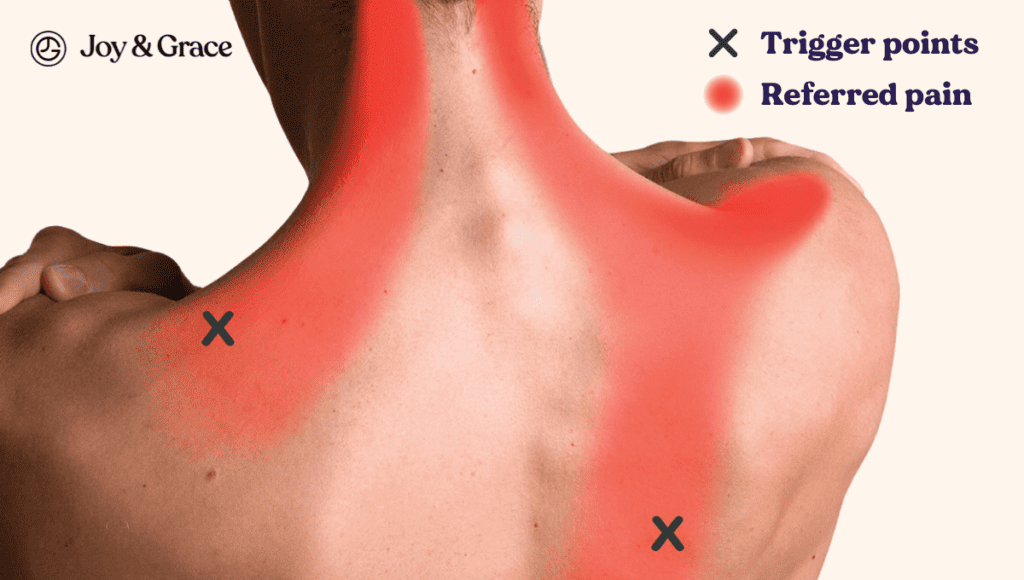
Body pain can sometimes be a tricky puzzle. Take shoulder pain, for instance. It doesn't always mean there's an issue with the shoulder itself.
Some organs that can cause pain in the left shoulder include the:
- Kidneys
- Heart
- Lungs
- Gallbladder, and
- Pancreas.
Let us talk about each of these one by one.
Kidney Problems - How Do I Know if My Shoulder Blade Pain Is Kidney Related?
If you think your back pain might be due to a problem with your kidneys, there are some signs you can look out for. Some of these include:
- Going to the toilet a lot
- Finding blood in your urine (hematuria)
- Feeling sick or throwing up (nausea or vomiting)
- Fever
- Feeling tired (body malaise)
- Change in urine color
- Swelling in the hands and feet
If kidney stones are the culprit, they usually produce other symptoms as well, including:
- Intense cramping pain (renal colic)
- Pain at the back side (flank pain)
- Recurrent urinary tract infections
The pain you feel with a kidney stone has a unique character. It's often described as severe and sharp and can be a constant ache or throbbing pain.
It's also relentless, which means it doesn't go away when you move or change your body position.
Where Does Your Back Hurt When It's Your Kidneys?
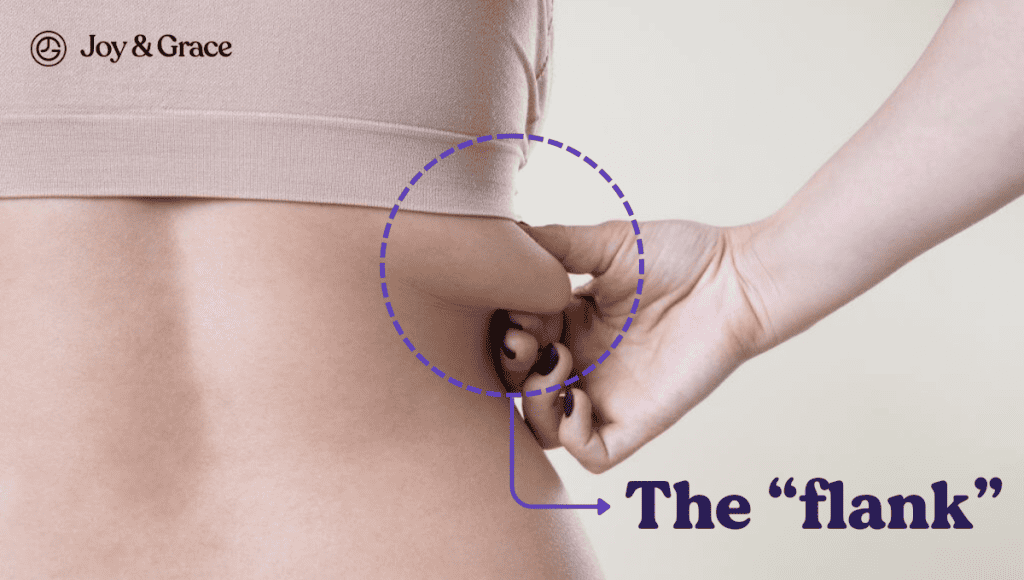
If your back pain is due to a kidney problem, you will likely feel it in a specific spot.
Kidney pain usually happens on either side of your spine, just below your rib cage, in an area known as the 'flank.' The pain might spread to other places, such as your stomach or groin.
Heart problems - How Do I Know if Shoulder Blade Pain Is Heart Related?
While it's possible, shoulder blade pain alone is rarely a direct indicator of heart problems.
It's important to note that heart issues typically present with other, more recognizable symptoms.
Nevertheless, being mindful of the various manifestations of heart conditions, including how they might relate to shoulder pain, is always beneficial.
- Heart Attacks: Heart attacks can manifest in various ways, not always as the sudden, intense event many imagine.
Often, they begin with mild pain or discomfort that gradually intensifies.
While chest pain is a common symptom, a heart attack may also cause discomfort in one or both arms, the back, neck, jaw, or stomach. Additional symptoms can include shortness of breath, cold sweats, nausea, or light-headedness.
It's important to note that some heart attacks may occur without these classic signs. Too many people put off going to the doctor because they think their symptoms won't get worse on their own or think they aren't bad enough.
Please always prioritize a check-up for any symptoms that don't go away or seem odd.
- Pericarditis: This is when the pericardium, which is a sac-like tissue that surrounds the heart, gets inflamed. Pericarditis can cause constant pain under the shoulder blade in the upper neck and shoulder muscles.
- Aortic Dissections: These are severe conditions involving a tear in the aorta, the large vessel that comes off the heart. Aortic dissections can cause severe back pain and need to be treated in the hospital.
Notable symptoms of aortic dissections include:
- Severe chest or upper back pain, often described as a ripping sensation
- Shortness of breath
- Loss of consciousness
- Weakness or paralysis on one side of the body
- Difficulty speaking or slurred speech
- Rapid pulse or palpitations
Lung problems - How to Know if the Shoulder Blade Pain is Lung Related?
Sometimes, pain in your shoulder blade could indicate a lung problem. Certain lung conditions can cause chest or upper back pain, including the area around your shoulder blades. Here's what you should know:
- Pneumonia:
Pneumonia is an infection that makes the air sacs in the lungs swell up. It can cause chest and upper back pain that gets worse when you cough or take big breaths.
This infection can additionally cause pleurisy, an inflammation of the chest cavity lining, causing sharp pain that can spread to the shoulder area and worsen with deep breathing, coughing, sneezing, or laughing.
People who have pneumonia often also have other symptoms, such as fever, chills, and trouble breathing.
Though it can be severe, timely medical intervention usually leads to a full recovery. - Pulmonary Embolism:
Pulmonary embolism (PE) is a serious condition where one or more arteries in the lungs become blocked, typically by blood clots.
This condition can manifest with various symptoms, some of which might relate to shoulder blade pain.
PE typically causes sudden, sharp chest pain that may worsen with deep breathing, coughing, or eating. This pain can sometimes radiate to the shoulder blade area, particularly if the embolism is located near the lung's outer regions.
Other common symptoms of pulmonary embolism include shortness of breath, a rapid heart rate, light-headedness, and coughing up blood.
Due to its potential severity, any suspicion of pulmonary embolism warrants immediate medical attention. Early diagnosis and treatment are crucial to managing this condition effectively.
Gallbladder problems - How to Know if the Shoulder Blade Pain is Gallbladder Related?
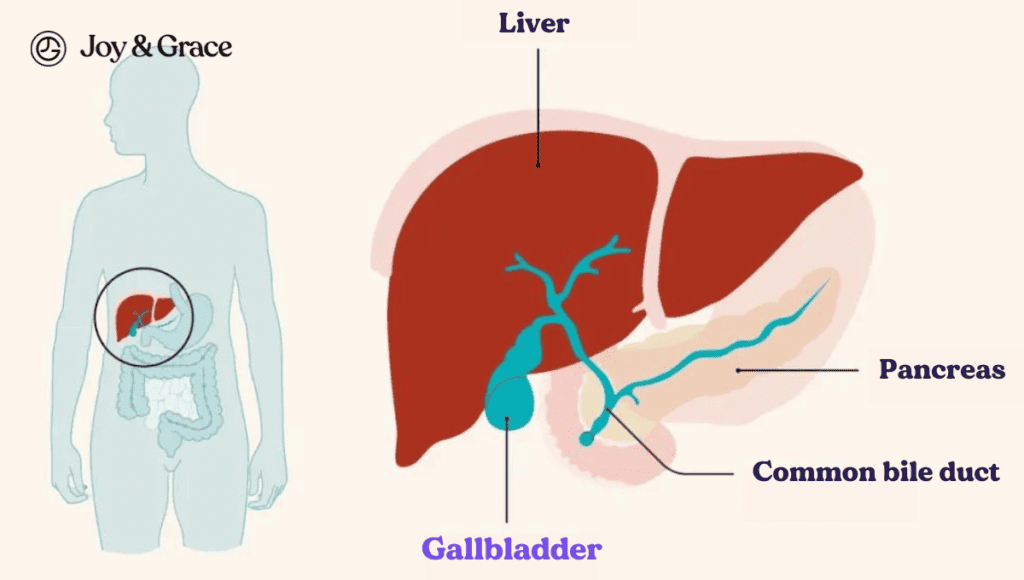
The gallbladder is a tiny organ located just under the liver, and it stores something called bile, which your liver makes to help digest fats.
Here are some signs that your shoulder blade pain might be related to your gallbladder:
- Gallstones:
The pain from gallstones can get worse over time. This pain can extend to your right shoulder blade.
Conditions that present as complications resulting from gallstone obstruction include gallbladder inflammation, also known as cholecystitis.
Cholecystitis can cause significant pain in the upper right part of your abdomen, which can spread to your right shoulder or back, even reaching your shoulder blade.
Shoulder blade pain, nausea, vomiting, fever, jaundice, and dark urine may indicate a gallbladder disease. If you're feeling these symptoms along with shoulder blade pain, you must get medical help. Getting quick medical treatment can prevent more severe problems and lead to better results.
Pancreas problems: How to Know if the Shoulder Blade Pain is Pancreas Related?
The pancreas is a vital organ that helps digest food and keep blood sugar levels steady.
One cause of pancreas-related shoulder blade pain is pancreatitis.
Pancreatitis means inflammation of the pancreas. The two most common causes of pancreatitis are gallstones and heavy alcohol consumption.
Pancreatitis can cause back and shoulder pain. There may also be nausea, vomiting, a fever, and pain present. The pain typically worsens after eating.
How Do I Get Rid of Back-of-Shoulder Pain on the Left Side?
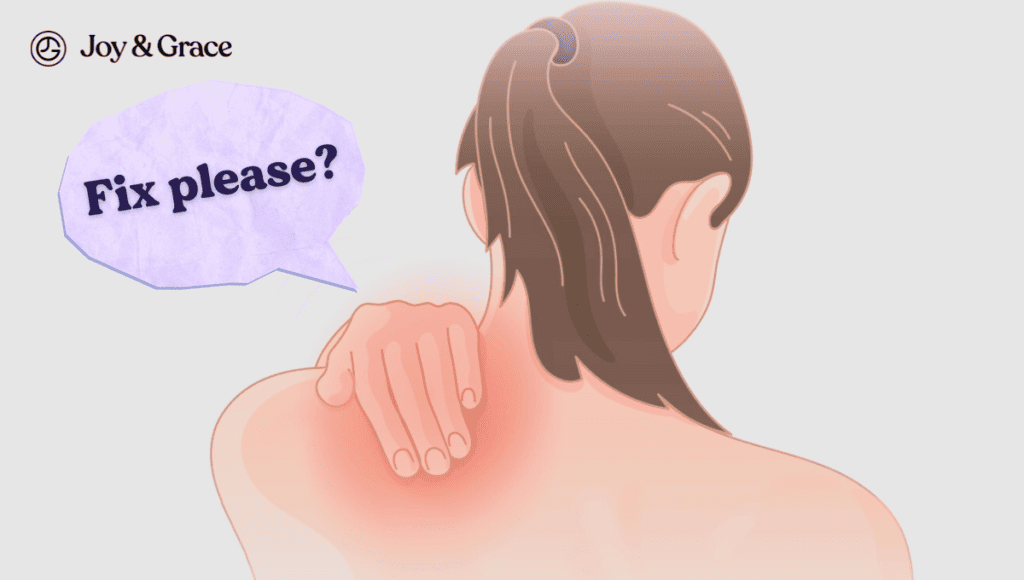
If you're feeling pain in the back of your left shoulder, how you deal with it might depend on the underlying condition. If the pain is due to muscle strains or poor posture, which are common causes of shoulder pain, there are several things you can try:
- Initial rest:
Begin by resting your shoulder to reduce inflammation and accelerate healing. Avoid physical activities that increase pain during this initial phase. - Applying Ice or Heat:
Ice can help with immediate pain relief and lessen swelling. Later on, applying heat can help relax and loosen the tissues and stimulate blood flow to the area. - Transition to Movement
Once the acute pain subsides, start with gentle exercises and stretches. These will strengthen your shoulder muscles and prevent future strains. A gradual shift from rest to movement is beneficial, as supported by studies showing that exercises can alleviate shoulder pain. - Improving Your Posture:
Poor posture can put unnecessary strain on your shoulder. Making sure to sit up straight and keep your shoulders relaxed can sometimes help reduce pain. - Pain Medications:
Over-the-counter pain relievers like acetaminophen (Tylenol) or nonsteroidal anti-inflammatory drugs (like ibuprofen) can help lessen pain and inflammation.
If your shoulder pain is caused by one of the problems we talked about earlier, though, painkillers might help for a short time, but you should really see a doctor.
They can help you determine what's causing your pain and suggest the proper treatment. A healthcare provider should check for persistent or severe shoulder pain to rule out serious conditions.
When Should I Worry About Left Shoulder Blade Pain?

While some occasional discomfort in your left shoulder blade might not be a big deal, some symptoms might signal a more serious problem. It's important to pay attention to how severe your pain is, how long it lasts, and if you have any other symptoms along with it.
Here are some signs that your left shoulder blade pain might need immediate medical attention:
- Severe Chest Pain or Pressure:
Serious chest pain or pressure, especially if it spreads to your arm, jaw, or back, could be a sign of a heart attack. This is a medical emergency, and you should get help right away. - Shortness of Breath:
If you're having trouble breathing along with your shoulder blade pain, it could be a symptom of a heart or lung problem. You should get medical help right away if you have this combination of symptoms. - Intense, Ripping Pain:
Intense, ripping pain that goes from your shoulder blades down your back can be a sign of an aortic dissection. This is a life-threatening condition that needs immediate medical attention. - Persistent or Worsening Pain:
If your pain doesn't get better with rest, keeps getting worse over time, or is extremely severe, you should see a healthcare professional to rule out any serious conditions.
Please also remember that these are just guidelines. If you're ever unsure about your symptoms, it's better to be safe than sorry and seek medical advice. Finding a problem early often leads to more effective treatment.
Takeaway
Shoulder blade and left shoulder pain can be caused by a number of things, from simple muscle strains to more serious health problems. Moderate or mild pain usually resolves on its own with rest and home remedies. Persistent or worsening discomfort, on the other hand, warrants medical evaluation.
Pay attention to any symptoms alongside the pain, like shortness of breath, nausea, vomiting, or severe chest discomfort. These can indicate serious medical issues requiring urgent care.
Catching problems early on often improves outcomes. Discuss any lingering or concerning symptoms with your healthcare provider right away.
